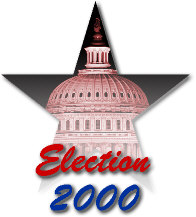![]()

This is one of a series of political profiles produced by political psychologist Aubrey Immelman and his students in the Unit for the Study of Personality in Politics at the College of St. Benedict and St. John's University in Collegeville, Minn.
December 5, 1999
Certain character traits will help Hillary during her race for U.S. Senate, others may hinder
By Jennifer Jo Hagel
and Aubrey Immelman
College of St. Benedict and St. John's University
Recently, Gail Sheehy’s unauthorized biography, "Hillary’s Choice" (Random House), hit the bookstores. It created something of a media stir on NBC’s "Dateline" and the cable television talk-show circuit.
In her book, the writer for Vanity Fair reveals that the first lady may have "inhaled" in days gone by, and that a 1960s boyfriend described Hillary as "passionate" and himself as "150 pounds of pulsing hormones."
So, what else is new? Sex, drugs, and — what the heck — rock ‘n’ roll have become emblematic of the muck-raking, sensationalistic, "gotcha" pop-psychological reporting in this era of baby-boomer politics.
Sheehy's book offers a smattering of legitimate psychological insights relevant to Hillary Rodham Clinton’s political ambitions and leadership potential as she runs for the open U.S. Senate seat in the state of New York. Some of those include Hillary’s lack of accountability and externalization of blame, her combativeness and tendency to crucify opponents, her toughness and lack of empathy, her persistence in the face of adversity, and her strategic manipulation of Bill Clinton.
But what does systematic, empirical observation reveal about Clinton’s political personality? In a study conducted in 1997 and 1998, we established that Clinton’s personality had a primarily dominant, controlling pattern with distinctly ambitious, highly confident features. She also had strong, though secondary, conscientious qualities.
What this means, in practical terms, is the following:
Dominant individuals, in the words of personality theorist Theodore Millon, enjoy the power to direct others and to command compliance and respect. They have an intimidating presence, are tough and unsentimental, and thrive in leadership roles.
Indeed, more than any other personality type, they gain satisfaction in actions that dictate and manipulate the lives of others.
According to Millon, many of these personalities succeed in sublimating their power-oriented tendencies in publicly approved roles and vocations (beats haranguing one’s friends and intimates), though their aggressive inclinations sometimes become evident in intransigence, stubbornness, and coercive behaviors.
Despite these periodic negative expressions, writes Millon, controlling types typically make effective leaders, being talented in supervising and persuading others to work for the achievement of common goals.
John Oldham and Lois Morris, in "The New Personality Self-Portrait," rather breathlessly extol the virtues of this forceful personality pattern: "While others may aspire to leadership, aggressive men and women move instinctively to the helm. They are born to assume command as surely as is the top dog in the pack. Theirs is a strong, forceful personality style, more inherently powerful than any of the others.
"They can undertake huge responsibilities without fear of failure. They wield power with ease. They never back away from a fight. They compete with the supreme confidence of champions. ... When put to the service of the greater good, the aggressive personality style can inspire a man or woman to great leadership, especially in times of crisis."
Next, the hallmark of the ambitious aspect of Clinton’s personality is an unshakable belief in oneself and one’s talents.
According to Millon, these personalities are competitive and self-assured, easily assume positions of leadership, act in a decisive and unwavering manner, and expect others to recognize their special qualities and cater to them.
Of special relevance to Clinton’s bid for the Senate, these individuals often succeed in realizing their ambitions and typically prove to be effective leaders.
However, they do have a potentially fatal flaw: their lack of social reciprocity and their sense of entitlement — an assumption that what they wish for is their due.
Finally, as for the conscientious component of Clinton’s personality, its essence is a principled morality and moral certitude. (It is the latter that can be troublesome in a leader.) These personalities, note Oldham and Morris, are quintessentially "loyal to their families and chosen causes," epitomize the work ethic, and "won’t rest until the job is done and done right."
In summary, our profile suggests that Clinton’s major personality strengths as a senator will be her commanding power, her clear-eyed vision and unwavering confidence, and her diligent pursuit of mission. Her major weaknesses likely will be her relative lack of congeniality (or collegiality), her uncompromising assertiveness, and a potential for closed-minded inflexibility.
Venturing further, we speculate that her public role will serve as a conduit for the expression and magnification of pre-existing personality traits, the central feature of which is a forceful, unyielding, power motive.
If elected junior senator from the state of New York next November, the patterns outlined here will be the golden thread running through the tapestry of Clinton’s political motives, legislative endeavors, and personal political style.
Books such as Sheehy’s can be a perfectly good read, informative and entertaining, but they are no substitute for more rigorous analysis of personality in politics.
Unfortunately, in their reluctance to tread this conceptual minefield, academic psychologists have left a void filled by other, less qualified practitioners plying their trade of political psychobiography.
Jennifer Hagel graduated in 1998 from the College of St. Benedict, where Aubrey Immelman is an associate professor of psychology. They presented their study of Hillary Clinton at the 1998 annual scientific meeting of the International Society of Political Psychology, in Montreal, Quebec.
![]()
News | St. Cloud Times Online | CareerTimes | Classified Times | Hometimes
Copyright 2000 St. Cloud Times

